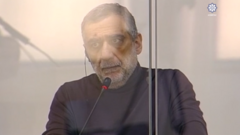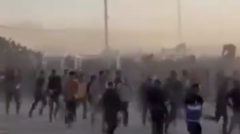Ruben Vardanyan, an Armenian billionaire, is currently on trial in Azerbaijan facing war crimes charges as peace negotiations unfold between Armenia and Azerbaijan. His legal troubles, including allegations of torture and isolation in custody, shadow the potential resolution of a decades-long conflict over Nagorno-Karabakh, raising questions about the future of ethnic Armenians in the region.
Armenian Tycoon on Trial: A Tenuous Position Amidst Peace Negotiations

Armenian Tycoon on Trial: A Tenuous Position Amidst Peace Negotiations
Ruben Vardanyan, an influential Armenian businessman, faces serious war crimes charges in Azerbaijan while a peace deal looms over the region.
Ruben Vardanyan, one of Armenia's wealthiest individuals, is entangled in a legal battle in Azerbaijan that could lead to a life sentence, as negotiations for a peace deal to resolve the longstanding conflict over Nagorno-Karabakh progress. Vardanyan, along with 15 other former ethnic Armenian leaders, stands trial in Baku's military court, facing charges that include planning war and terrorism, stemming from actions taken decades ago. This situation highlights the increasingly dire circumstances for Vardanyan, who has amassed a fortune in Russia and once mingled with high-profile personalities like George and Amal Clooney.
In recent court appearances, images have captured apparent bruising on his forehead amidst allegations of torture—claims Azerbaijan vehemently denies, asserting that Vardanyan's rights are being respected. Once a celebrated entrepreneur who founded Russia's first investment bank and led a prominent business school, Vardanyan’s personal, professional, and philanthropic endeavors have taken a dramatic turn since his move to Nagorno-Karabakh in September 2022.
Following his relocation to the contested region, Vardanyan renounced his Russian citizenship and became a vocal leader for Karabakh Armenians. However, tensions escalated rapidly, as Azerbaijani authorities imposed a blockade, triggering severe food shortages and ultimately leading to a military operation that quickly regained control of Nagorno-Karabakh. As he was attempting to join a mass exodus of Armenians fleeing the area, Vardanyan was apprehended by Azerbaijani forces.
His trial, viewed by many as politically motivated and a potential "show trial," contrasts sharply with the peace negotiations between Armenia and Azerbaijan. The ongoing litigation, which has seen Vardanyan endure two hunger strikes protesting judicial processes, comes amid criticism directed at Armenian leadership for not addressing the cases of political prisoners like him in the peace context.
The complex dynamics of the region remain fragile, with many fearing that Vardanyan's case—and those of other detained Armenian leaders—might be disregarded in favor of a broader peace agreement. Critics argue that excluding these vital issues from discussions could set a dangerous precedent, potentially exacerbating tensions and continuing the cycle of conflict. With Vardanyan set to return to court soon, observers are left questioning the future for ethnic Armenians in Nagorno-Karabakh and what this trial portends for the ongoing peace process.

















